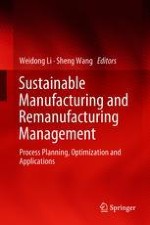2019 | OriginalPaper | Buchkapitel
4. A Systematic Approach of Process Planning and Scheduling Optimization for Sustainable Machining
verfasst von : S. Wang, X. Lu, X. X. Li, W. D. Li
Erschienen in: Sustainable Manufacturing and Remanufacturing Management
Aktivieren Sie unsere intelligente Suche, um passende Fachinhalte oder Patente zu finden.
Wählen Sie Textabschnitte aus um mit Künstlicher Intelligenz passenden Patente zu finden. powered by
Markieren Sie Textabschnitte, um KI-gestützt weitere passende Inhalte zu finden. powered by
